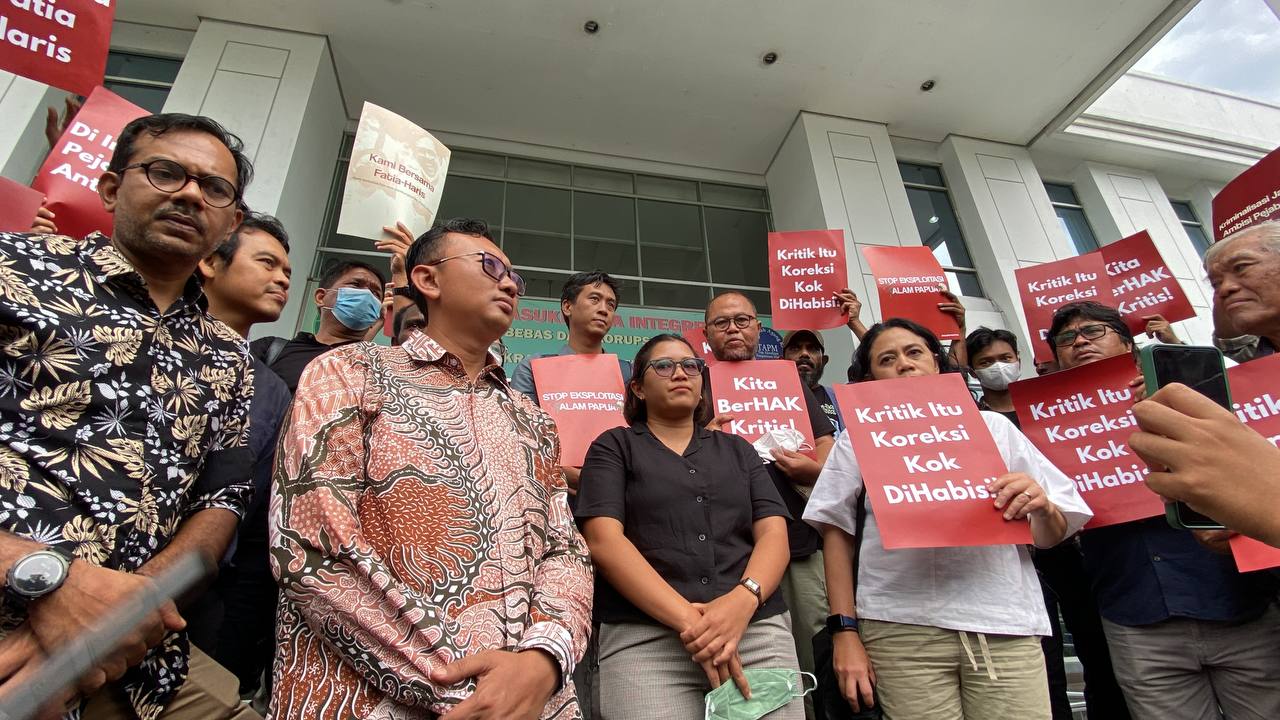Two prominent human rights activists were in court on Monday to face charges of defamation and slander brought by a senior minister in a case civil society groups denounced as a blow to free speech in Indonesia.
The activists, Haris Azhar and Fatia Maulidiyanti, alleged in a 2021 YouTube video that Luhut Pandjaitan, maritime affairs and investment minister, was involved in a controversial government project to develop a massive gold mine in the restive Papua region. Luhut denied he had any stake in the project.
According to the indictment read at the East Jakarta District Court, Haris and Fatia talked about a report that alleged human rights violations and environmental damage caused by mining activities in Wabu Block in Papua’s Intan Jaya regency, where violence between government forces and Papuan separatist rebels has been on the rise.
Indonesia’s state-owned PT Aneka Tambang Tbk plans to operate a gold mine in the Wabu Block, which is believed to have gold ore deposits of about 117.26 million tons, according to a 1999 survey by U.S. mining company Freeport-McMoRan.
In the video, Fatia alleged Luhut owned shares in Toba Sejahtra Group, a conglomerate whose subsidiary allegedly had a stake in one of the four companies that control the mining concession in Wabu Block.
In another part of the video, Haris accused “general or retired generals” of profiting from the gold mine project at the expense of Papuans.
Luhut is a retired four-star general and former commander of the army special forces Kopassus.
The activists’ remarks were “defamatory and slanderous because it spread false information,” the indictment said.
Luhut’s reaction
The prosecutors also described Luhut’s reaction to the allegations.
“He shook his head angrily and said this was outrageous,” the indictment said. “He said the words about him playing a role in mining in Papua were tendentious, untrue and very hurtful. He felt his good name and dignity had been attacked.”
Luhut’s spokesman said he had no business ties to Wabu Block or any other mining projects in Papua, and that he was only a shareholder of PT Toba Sejahtra, not its subsidiary PT Tobacom Del Mandiri. The spokesman said Tobacom had explored a possible partnership with another company operating in Papua but did not pursue it.
One of the most influential figures in President Joko “Jokowi” Widodo’s cabinet, Luhut filed a lawsuit against Haris and Fatia after they ignored two of his subpoenas and demand for an apology.
Under the criminal charge, the activists face up to four years in prison if convicted under the electronic information and transactions law, which has been criticized by rights groups as a tool to stifle dissent and criminalize online speech.
Haris, executive director of Lokataru, a legal aid foundation, said he did not accept the charges and did not understand their substance.
“Much of the indictment is slander against me,” he said.
The defendants’ lawyers asked prosecutors to drop the case, saying their criticism of Luhut was not a criminal offense.
Outside the court in East Jakarta, dozens of supporters staged a rally to express solidarity with the activists. They said the case was an example of judicial harassment and a threat to freedom of expression in Indonesia.
“This case will only add to the black record of democracy in Indonesia,” said a statement by the Coalition of Civil Society, which includes KontraS and other groups.
“Fatia and Haris are also victims of judicial harassment where legal instruments are used to criminalize people who are active in expressing their opinions.”
Amnesty International (AI) released a statement on Monday calling for the charges to be dropped against the activists.
“This is a clear example of how human rights defenders in Indonesia are facing mounting repression over their peaceful expression. The work of human rights defenders must be protected, not repressed – not least in light of Indonesia’s proposed candidacy for UN Human Rights Council membership in 2024-26.
“We therefore urge the Indonesian authorities to drop all charges against Fatia and Haris, who have been targeted simply for having a discussion on YouTube.”
In a report released last week, AI said civil liberties in Indonesia are declining due to the enactment of repressive laws, ongoing violence by authorities in response to protests, and high levels of impunity.
The report said human rights defenders, academics, journalists and students were among those prosecuted and harassed for their legitimate activities.
In a separate report released last year titled “Gold Rush,” the rights watchdog documented a dramatic increase in violence since 2019 in Intan Jaya, where Wabu Block is located.
This includes cases of extrajudicial killings and greater restrictions on movement targeting indigenous Papuans, based on interviews with locals between March 2021 and January 2022.
AI documented 12 suspected cases of unlawful killings by security forces in Intan Jaya since 2019. The group also reported that indigenous Papuans faced restrictions on their freedom of movement and expression, including their hairstyle.
Located south of the Sugapa district, the main town in Intan Jaya, Wabu Block could hold about 8.1 million ounces of gold, making it one of Indonesia’s five largest-known gold reserves, according to AI. The proposed mining area covers 170,500 acres – about the size of Jakarta – it said, citing official documents.
Since the 1960s, Papua has been home to a separatist insurgency, while the country’s security forces have been accused of human rights abuses in counter-insurgency operations.
In 1963, Indonesian forces invaded Papua – like Indonesia, a former Dutch colony – and annexed the region that makes up the western half of New Guinea island.
Papua was incorporated into Indonesia in 1969 after a United Nations-sponsored vote, which locals and activists said was a sham because it involved only about 1,000 people. However, the U.N. accepted the result, essentially endorsing Jakarta’s rule.
By Nazarudin Latif and Pizaro Gozali Idrus for BenarNews
Copyright ©2015-2023, BenarNews. Used with the permission of BenarNews.





Reader Interactions